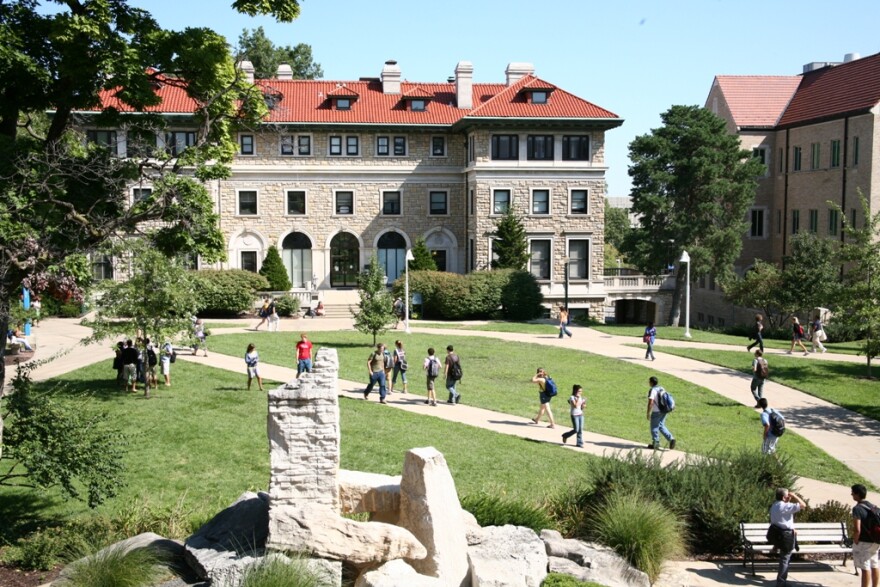The decision to merge the positions of president of the University of Missouri System and chancellor of its largest campus has drawn widespread opposition from the faculty of the University of Missouri-Kansas City.
On Tuesday, the University of Missouri Board of Curators voted to repose in the hands of one person the authority of the University of Missouri System president and University of Missouri-Columbia chancellor. That person is Mun Choi, who has been system president since 2017.
The Columbia campus is the largest of the four system campuses and now that it's the new seat of power, faculty are concerned that the three other campuses' autonomy, identities and funding could be threatened.
In an already uncertain time, it's a development without precedent, although in the past the positions have been temporarily combined.
“It’s not unusual for the system president to become an interim chancellor," says Tom Mardikes, professor of theater at the university’s conservatory. "Elson Floyd came to Kansas City, and he served as interim chancellor for about six months, until UMKC got Guy Bailey as chancellor. I think it’s happened at other campuses.”
Mardikes is also chair of UMKC's faculty senate, which is comprised of professors from each of the 11 academic units.
He says faculty at each of the three other system campuses — Rolla, St. Louis, and Kansas City — unanimously opposed the merger in mid-July and stated so in a letter to the Board of Curators. The board of curators nonetheless unanimously voted in favor of combining the positions.
The nine members of the board are not faculty members themselves but are appointed by the governor. The members are meant to be regionally and politically balanced, half of them Republicans, half of them Democrats.
Unlike boards in the past, however, eight of the nine current members are alumni of the University of Missouri-Columbia, where Choi will be based.
Mardikes says he doesn’t understand why merging the two positions was so urgent. He says it wasn’t about money: having one person perform both jobs will save only about $500,000 a year.
“They couldn’t give us a definitive reason as to why this needed to happen. They said they’d send a list and they never did,” Mardikes says. “We don’t know, because they won’t say. Whatever it is, one can say it might be insidious enough that they’re not going to speak it.”
Mauli Agrawal, UMKC's chancellor, wasn't available for comment, but in a statement he said:
I respect the decision of the Board of Curators and appreciate the fact that they are willing to ask hard questions regarding the governing structure of the University of Missouri System. It is clear that the Board recognizes the lasting significance of any changes to this structure and the potential impacts on each individual campus. Through the ongoing process approved by the Board, we must ensure that the entire UM System flourishes and UMKC can thrive and continue to be the vibrant and vital urban resource of teaching, research and service that Kansas City depends on.
Mardikes says one reason faculty at the other three campuses opposed the merger is concern that their campuses might become “teaching colleges.”
As it is, he says, professors typically spend 40% of their time teaching, 40% doing research and 20% in service to some part of the university community.
That means that in most academic years, a professor spends one semester teaching two courses and the other teaching three in order to have time for research. Current belt-tightening measures have forced most professors to accept three courses each semester, leaving no time for research.
“If you’ve gone into this to be a researcher and you’re publishing and you’ve got research projects and you’re also going to teach your subject, then to have that sort of change on you at your institution is a real setback,” Mardikes says.
So those who are able to find grants will likely leave for other institutions, he suggests.
One other pressing concern has to do with fundraising. UMKC is Kansas City’s university: the university supports Kansas City's residents and the residents support the university.
“It becomes a real problem if major funders and donors suddenly feel like 'I should be talking to Choi,'" Mardikes says. "If he gets seen as the de facto head of everything and if the chancellors on the other campuses are sort of like just administrative positions, then things will really be bad for the other three campuses.”
Mardikes says many faculty members system-wide see Choi as a dynamic and hardworking member of the academic community. Choi has been part of the system for three years and has spent time on all of the campuses.
But Mardikes says it's not a good idea to do a structural reorganization based on the talents of one individual. The average term of someone in the position of president or chancellor is three to five years.
“What happens when the Mizzou faculty wants to put forward someone who’s been their provost or someone internal to the Columbia campus?" Mardikes asks. "Now we have someone who doesn’t know the other campuses at all.”
A couple of the faculty’s recommended safeguards were put in place by the board. One of them was for the four campus chancellors to meet once a month and for all major decisions to be made by them.
And while that’s helpful, he says, “Keep in mind that the system president/MU chancellor is the first among equals. It's sort of like the church hierarchy. Choi’s still going to hold the cards.”
KCUR is licensed to the University of Missouri Board of Curators and is an editorially independent community service of the University of Missouri-Kansas City.



